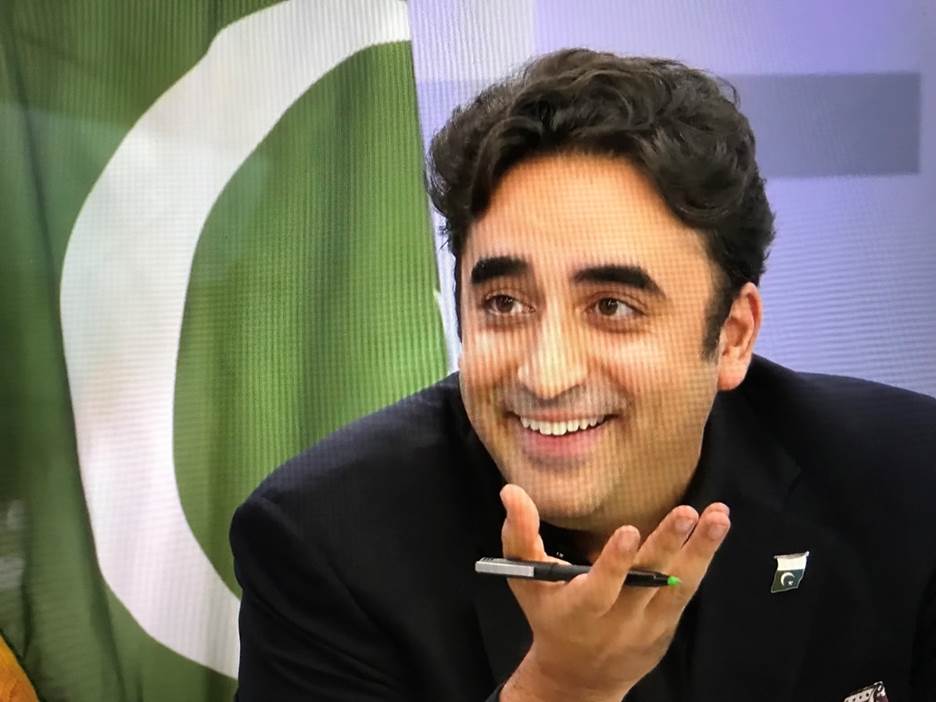
Down the Line, the Story for Pakistan Is One of Opportunity, Says FM Bilawal Bhutto Zardari
By Elaine Pasquini

Washington: Over the last seven months the United States and Pakistan have been engaging on a variety of issues beyond counterterrorism, including climate, tech, health care and agriculture, Pakistani Foreign Minister Bilawal Bhutto Zardari told an Atlantic Council audience on December 20.
There have also been visits from high level US State Department officials to engage with the business community to explore mutual economic opportunities. “The United States is still Pakistan’s biggest customer but there is far more economic potential for us to unlock,” he said.
Unfortunately, however, Pakistan is facing many crises – the lingering covid pandemic, the economy, and higher prices resulting from the war in Ukraine. But the biggest challenge for the people of Pakistan right now is a “climate catastrophe of biblical proportions,” the minister stressed.
Not only have the unprecedented floods created a health crisis, but also an educational crisis. “From my home province of Sindh, 47 percent of our educational infrastructure has been either partially or completely damaged as a result of the flood,” preventing 52 percent of schoolchildren in Sindh from attending classes, Zardari explained. The agriculture sector – the backbone of Pakistan’s economy – was devastated. “Our farmers had five million acres of standing crops destroyed during the floods that affected the rice, cotton and wheat crops.”
From an economic, agricultural and food security perspective this remains an enormous challenge, Zardari said. Pakistan is ready to “seize this challenge, seize this moment and ensure that we create an opportunity out of this crisis” to improve the lives of everyone affected by the tragedy.
Stressing the importance to engage internationally, the minister expressed his appreciation to UN Secretary-General António Guterres for co-hosting the upcoming Conference on Climate Resilient Pakistan in Geneva. “But we don’t see that as an end in itself,” he said. “It is the start of a process to show the world how we can turn this catastrophe into an opportunity.”
Noting that while Pakistan may have been the first country to have an historic climate change disaster, other countries are experiencing them also. “If we get this right and have international partners in dealing with this catastrophe, then we will be working together as an international community to deal with the climate challenge,” he pointed out. Despite the challenges, “I am convinced that with hard work and consistent engagement we will be able to overcome this crisis.”
Addressing Pakistan’s security situation as cross-border attacks from the Tehreek-e-Taliban in Afghanistan have increased, Zardari noted the security situation is far more improved and stable than it was in 2007. “There is more confidence in people to do business in Pakistan today than there was then,” he said. But, he added, the business economy could be put at risk if security is not further improved and that would impact foreign investment. “No one wants to put lives at risk to conduct business.”
The Taliban-led government in Afghanistan needs to demonstrate their “will and capacity to deal with this issue,” Zardari said. “I still think there is space to explore on that front.”
Asked by Uzair Younus, director of the Pakistan Initiative at the Atlantic Council’s South Asia Center, about his top foreign policy priorities, Zardari said that it was “increased engagement with all of our partners – our historic partners, old friends, new friends.”
When taking office seven months ago, “all I wanted to achieve was a diversification in what we talked about…specifically everyone is looking to diversify economic opportunities at this time.”
Zardari believes there is a lot of untapped economic opportunities for Pakistan. “We haven’t expanded the complete economic potential between Pakistan and China, let alone Pakistan and Iran, Pakistan and Afghanistan and through Afghanistan to the Central Asian republics,” he noted.
One definite advantage for Pakistan is its geographical location which makes it a natural trade hub, particularly for Central Asian republics that could connect fastest through Pakistan to the Gwadar port. Zardari has had encouraging conversations with officials in the Central Asian states on this issue, he related.
While the continuing crises make it difficult to improve economic connections, “opportunities are there; but it’s easier with the less chaos we have,” he said. “The more that all of us have faith in the system and at least try and make the system work that’s what allows for the stability to come into play, but there definitely are questions about Pakistan’s political stability, economic stability, but that doesn’t mean we’re not trying to address it – questions, yes – does it mean we’re shutting the door, no.”
“I believe the story for Pakistan 10, 20 years down the line is one of opportunity, and my pitch to everyone is get in now.”
(Elaine Pasquini is a freelance journalist. Her reports appear in the Washington Report on Middle East Affairs and Nuze.Ink.)

